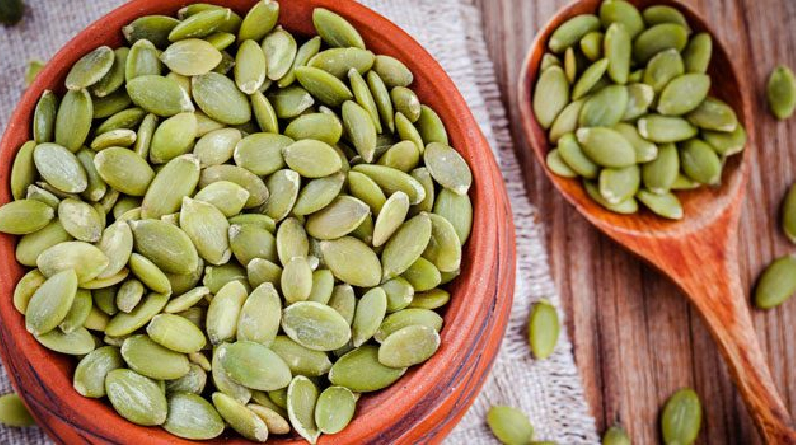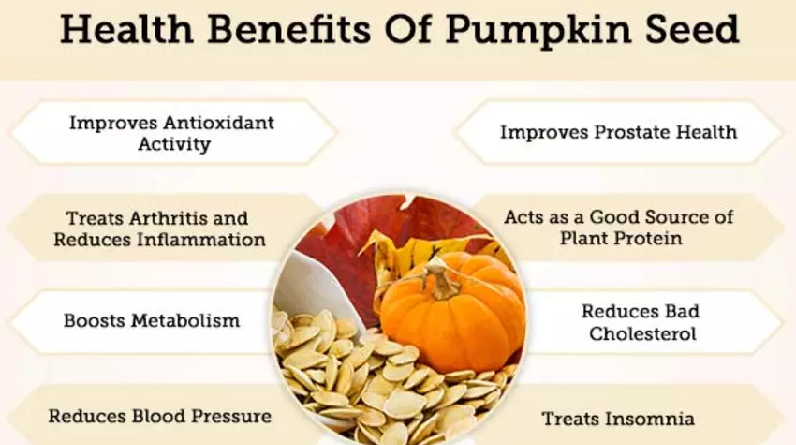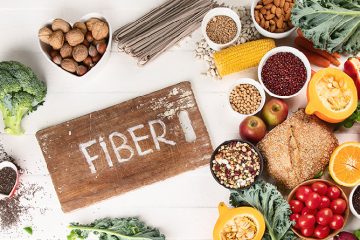Why You Should Eat Pumpkin Seeds

Pumpkin seeds are the seeds that grow inside pumpkins. They provide protein, unsaturated fat, fibre, magnesium, antioxidants, and more. Pumpkin seeds can be enjoyed as a snack, as a recipe ingredient, or in a variety of products, including pumpkin seed tofu, pumpkin seed butter, and pumpkin seed protein powder.
Benefits
Pumpkin seeds are loaded with nutrients that are needed to help you function. On top of the nutritional benefits pumpkin seeds provide, there might also be some direct health benefits of consuming the seeds.
Provide antioxidants
Pumpkin seeds contain antioxidants including phenols and flavonoids.
Phenols help fend off cell-damaging compounds in the body, which may protect against ageing and disease. Their anti-inflammatory, antimicrobial, and anticancer effects have also been well-documented.
Flavonoids have been linked to a broad spectrum of health-promoting effects, including protection against cancer, artery hardening, and Alzheimer’s disease. Like phenols, flavonoids counter compounds that damage healthy cells and have strong anti-inflammatory effects.
These antioxidant effects may be even greater with roasted pumpkin seeds. Research shows that, after roasting, pumpkin seeds have more phenols and flavonoids. Roasted pumpkin seeds are available for purchase, but roasting pumpkin seeds is also something people might do with the seeds they scrape out when carving a pumpkin.

Contain good fat
Per 1-ounce serving—about a quarter cup—pumpkin seeds provide more fat than protein or carbohydrates. That fat is mostly monounsaturated and polyunsaturated fat. Both these types of fat have been shown to reduce bad cholesterol levels in the blood, which can lower the risk of heart disease and stroke.
Rich in magnesium
Pumpkin seeds are a top source of magnesium. This mineral is needed for more than 300 reactions in the body, including maintaining nerve and muscle function, supporting a healthy immune system, keeping heartbeat steady, and strengthening bones. Magnesium also helps the body produce energy and manage blood sugar levels.
May help reduce breast cancer risk
Phytoestrogens are natural compounds in some foods, like pumpkin seeds, that are similar to the hormone oestrogen. A German study among postmenopausal women looked at the association of phytoestrogen-rich foods and breast cancer risk. The researchers collected data from more than 8,000 women and concluded that consumption of foods with phytoestrogens, including pumpkin seeds, was associated with significantly reduced breast cancer risk compared with not eating these foods. However, other research on the relationship between phytoestrogens and breast cancer has been mixed, so more research would be needed to know for certain whether there is a positive effect.
See Also: Every kid should be able to read a short story by the time they’re ten.
Their extracts may aid health
Human research on the direct health outcomes related to eating pumpkin seeds themselves is actually limited. But there are studies on how pumpkin seed products, such as extracts and oils, can benefit health.
Supplementing with pumpkin seeds may, according to a few small and mostly preliminary studies, Men between the ages of 50 and 75 who suffer from an enlarged prostate can have their symptoms, like waking up in the middle of the night to urinate, alleviated. Restore menopausal women’s cardiovascular health by doing things like lowering blood pressure and increasing blood flow. Handle symptoms of overactive bladder, such as the need to urinate frequently.
Nutrition
A pumpkin seed’s nutritional value is the same whether or not its shell is present. In one ounce, pumpkin seeds provide:(from the USDA)
- Weight: 163 calories
- Fat: 13.9g
- Fourteen point seventeen grammes of carbohydrates
- 1.84 grammes of fibre per day.
- 8.45g of Protein
- Magnesium levels at 156mg, or 37% of the DV
- With 2.17 milligrammes, zinc provides 19.7 percent of the recommended daily allowance.
- Iron 2.29mg, or 12.7 percent of the DV
Zinc is essential for healthy immune function and also aids in cell growth, pregnancy development, wound healing, carbohydrate breakdown, and insulin action. The senses of smell and taste rely on it as well. Iron is an essential mineral with numerous uses. It’s a component of haemoglobin, the protein responsible for transporting oxygen around the body and facilitating its use by the muscles. In addition, it can be found in a wide variety of other enzymes and proteins.
Leave a reply
You must be logged in to post a comment.







